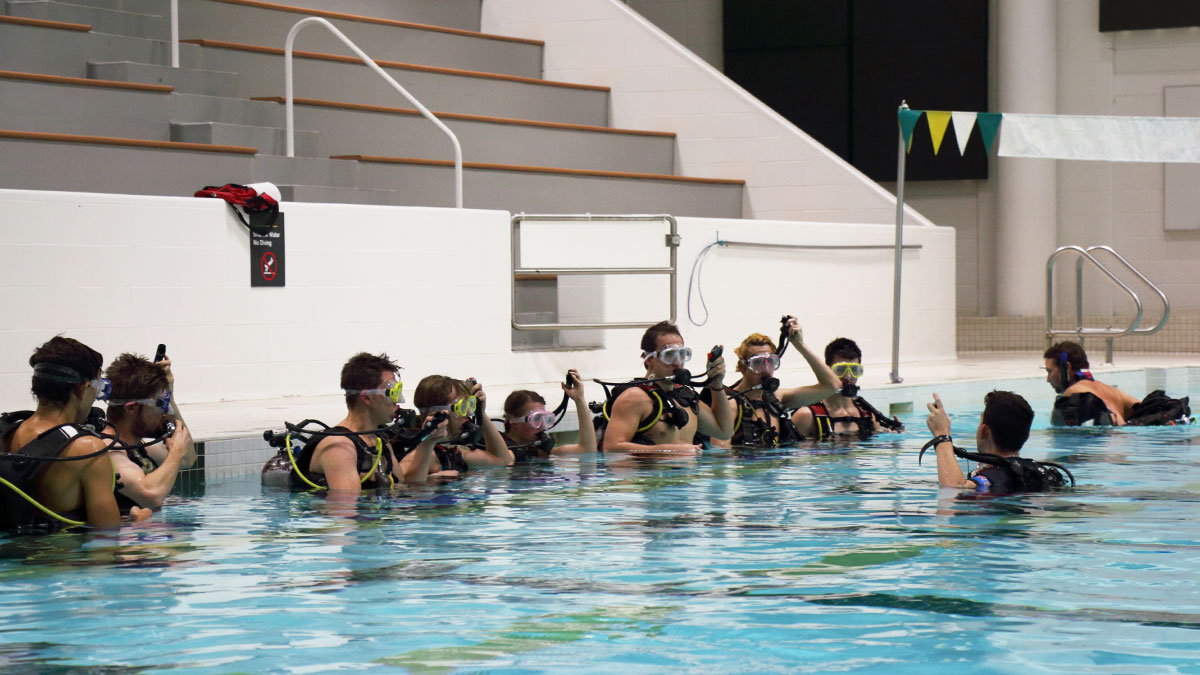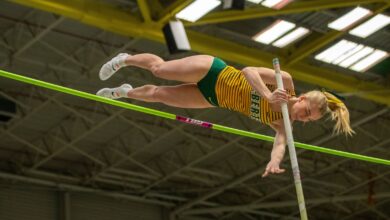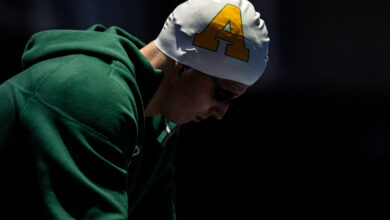U of A Scuba Club uniting adventure seekers on campus
 Supplied
SuppliedAlberta is completely landlocked, but that hasn’t stopped the U of A’s Scuba Club from trying bring underwater adventure to the university population.
Established in 2007, the club offers many incentives to students eager to try scuba diving. The goal for club president Laurence Pryor, a third year PhD student studying a nickel deposit in the Yukon, is to create a welcoming and accessible environment for new members.
“What we want to show (people) is that there is diving (in Alberta), and that there are ways of affording it, even on a student budget,” Pryor said.
The club makes the best of what they have in Alberta’s physical geography, hosting lake dive events around the province, and doing basic instruction in the Butterdome pool on campus. A particular highlight for the club this year was a dive in Clear Lake, in which members participated in an underwater pumpkin carving contest.
“It was a shit day, -2 C and snowing sideways, but everyone still had a great time,” Pryor said.
Scuba diving is viewed as an expensive activity, but the club offers a bursary for members less than 21 years of age through money received from a partnership with the Alberta Underwater Council.The major prerequisites for bursary includes having completed open water dive training, having participated in at least one scuba club event, and four hours of volunteer work with the club. Students who qualify for the bursary receive up to $400 towards their diver training at any place that offers it. The club itself doesn’t do full dive training, but they can set people up learn on their own time, essentially for free.
Andrew Maier, a Computer Engineering Masters student who served as club president from 2013 up until the beginning of the school year in 2015 said that the bursary has allowed the club to make significant progress in member retention.
“That’s been the biggest turn for our club I think, because we’ve been able to offer not only the free introductory sessions, but offer complete certification,” Maier said.
The bursary also covers the introductory sessions the club offers every month called Discover Scuba Diving, which are run by PADI (Professional Association of Diving Instructors), and are geared towards members with limited scuba experience. These sessions happen monthly, with the next one taking place on Feb. 17 in the west swimming pool in Van Vliet. The course itself is very hands on, with participants getting into the pool almost immediately.
“We try to keep the theory to a minimum, and the experience to a maximum,” Pryor said.
For anyone who’s looking for a more stimulating experience than diving in a pool, the scuba club also runs international trips every year. This year, they’re going to the Bahamas in February and May. Divers stay on a 65-foot sailboat, in dormitory style accommodations, which gives the trip a very student-friendly atmosphere.
Maier attended the club’s trip to the Bahamas last year, and said it was one of his most enjoyable diving experiences.
“The Bahamas is special because they really put you in a student environment,” he said. “You need no diving experience to go on (the trip), that’s the coolest thing.
“It’s like the backpacker/hostel version of a dive trip,” Pryor added.
Both Maier and Pryor have formed a connection to scuba diving due to the amazing sights it allows them to see. Maier referenced a Cenote dive he did in Mexico, which involves diving into a large sinkhole and exploring different caverns underground.
“I remember doing the cavern dive, and looking down and seeing the rays of light through the water. It just looked surreal,” he said.
For Pryor, his shark feeding dives in Fiji will always stick in his mind, especially when he saw his only hammerhead shark. He knew this particular dive was different when the smaller sharks didn’t immediately take the bait.
“I got a little nervous, so I dumped the food and swam behind the barrier they have for tourists. As soon as I did that, this hammerhead sloshes his way in, destroys the bait, and then swims off into the blue,” he said.
“This is a shark that a four-metre bull shark is scared of. I was so glad I got out of there.”
Camila Hurtado, a third-year Animal Health major, and the club’s Vice President of Finance, has also had the chance to see brilliant sights while diving. Despite being less experienced than both Pryor and Maier — only having been introduced to scuba diving in 2013 — she still did her open water certification in Mozambique, which allowed her to get a first-hand look at manta rays and whale sharks.
“I think it spoiled me a little bit, because it was my first time diving outside of a pool,” she said.
For the adventure seekers in the club, only scuba diving fulfills their desire to see some of the most unique environments on the planet.
“It’s adventurous and humbling at the same time,” Maier said. “You’re isolated, but you’re being shown this other world that maybe only a handful of people have ever seen.”




